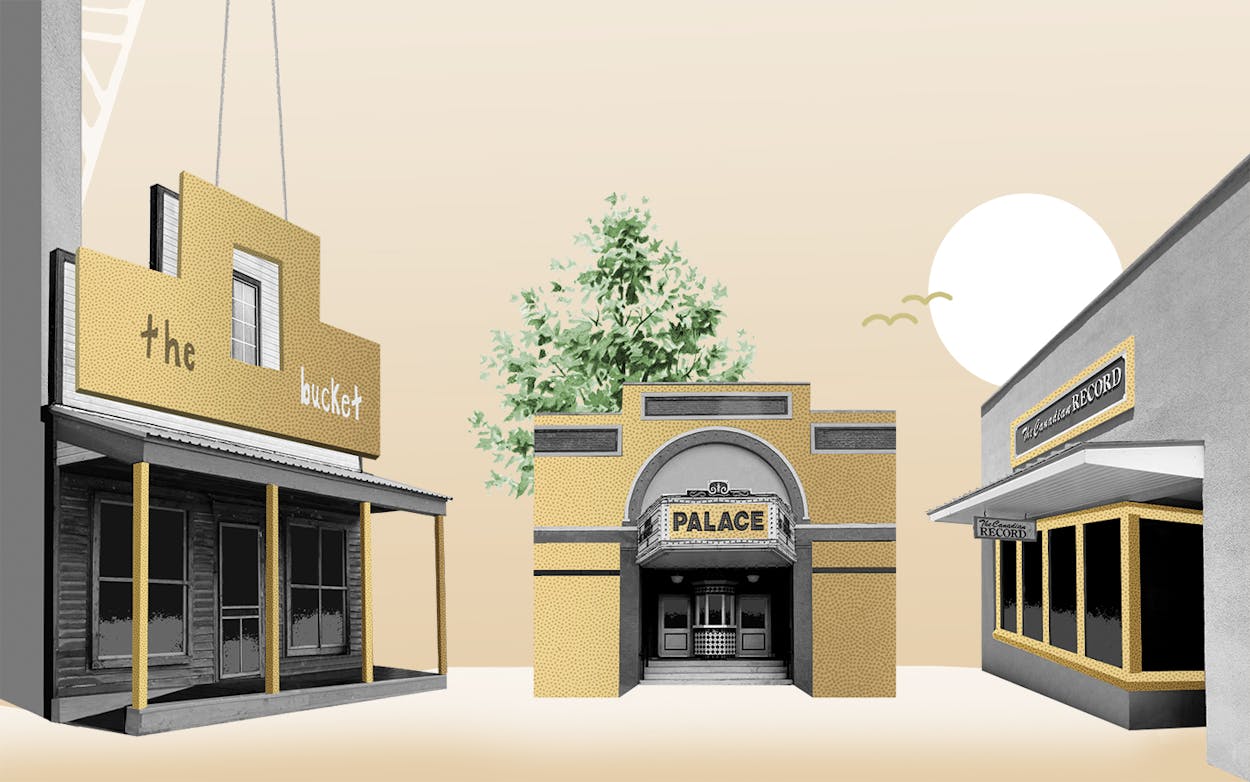Canadian
Pop. 2,683
In 1913, on the eve of World War I, a Lebanese immigrant named Nahim Abraham arrived at Ellis Island to meet his newly arrived wife and two children. Together they headed west, eventually reaching the remote Texas Panhandle town of Canadian, where Nahim had decided to make a new life amid the plains that rumple like an unmade bed.
The cattle business was booming at the time, and Canadian had become a railroad hub for the area’s ranches. Instead of saddling a horse or poking a cow, Nahim opened a dry-goods business called the Fair Store. It thrived, and so did the little town.
“Ranchers always had more disposable income than farmers,” Salem Abraham, Nahim’s great-grandson, told me recently. He was sitting in his second-floor office, at the foot of Canadian’s Main Street. “They had a dry-goods store in Wheeler [a small town 35 miles to the south], and they could never sell fancy clothes to the farmers over there. The farmers didn’t have the disposable income. Those big houses up the hill from where we sit? Ranchers built those houses.”
Today, Canadian is still bustling, though not because ranching remains a particularly profitable business. Rather, the town’s success has much to do with the Abraham family’s largesse.
Salem’s grandfather, Malouf Abraham Sr. (known as Oofie), was elected to the Texas House in 1966 as one of only nine Republicans in state government. Four years later he lost a bid to become a state senator, but Oofie went on to make a fortune in oil and gas. Salem estimates that his grandparents gave away more than $5 million to local causes like the YMCA and nursing home.
Salem’s father, Malouf Abraham Jr., left Canadian to study medicine and serve in the Air Force in Vietnam but came back home and ran an allergy clinic until his retirement, in 2001. His wife, Therese, served as the mayor of Canadian for a decade beginning in 1981. Their white-columned, red-brick former residence—it was the First Baptist Church before they moved in—is now the Citadelle Art Foundation, which has featured works from such renowned artists as Rembrandt and Chagall.
Then there’s the boyish-looking 53-year-old Salem. After graduating from the University of Notre Dame in 1987 with a degree in finance, Salem considered moving to Chicago or New York. Instead, he and his wife, Ruth Ann, who were high school sweethearts, returned to Canadian, where Salem established a hedge fund and arbitrage operation. Headquartered in the unlikeliest of places, Abraham Trading Company became hugely successful. Salem has since held seats on the Chicago Mercantile Exchange and the Chicago Board of Trade. In 1999, as the Chicago Mercantile Exchange was transitioning to electronic trading, his firm was the first to send computer-generated trading signals to the exchange—from a town so small that even few Texans have heard of it. His acumen earned high praise from none other than the late T. Boone Pickens. “I admire Salem and I consider him a great deal maker,” Pickens told the New York Times, “but there are some things he does I can’t fathom.” (Salem was a pallbearer at Pickens’s funeral.)
Twenty years ago, Salem and Ruth Ann found themselves ready and able, in Salem’s words, “to give away some money.” They considered the usual good causes. But then, as Salem explained, Ruth Ann had an idea: “Not a charity, not something you can write a check to and get a tax deduction. Let’s do something stupid.”
“Something stupid” turned out to be restoring the venerable Palace Theatre, on Main Street. Built in 1909, it was still showing second-run movies to dwindling audiences willing to tolerate a leaky roof. The Abrahams spent more than $1 million to restore the old movie house, in which they installed a THX-certified sound system that George Lucas invented for Return of the Jedi and, a decade later, a Sony digital projection system found in only 68 theaters around the country at the time.
To the Abrahams’ surprise, the theater became a catalyst for a downtown renaissance. Some twenty downtown buildings were remodeled, and the city partnered with the Texas Department of Transportation to transform Main Street with wider sidewalks, new lighting, and a visitor center. The Abrahams themselves ended up buying nine more downtown buildings and turning them into various business, including a furniture store, a clothing store, and the Abraham Trading Company offices, which occupy a wing inside a three-story restored hotel that’s also home to the Cattle Exchange restaurant, an homage to the area’s ranching history. “You needed somebody to prime the pump, and then others joined in,” Salem said.
Not everyone was thrilled, though. Some locals scoffed at all the changes. Salem’s friend Pickens had predicted as much. “Back in 1998, Boone Pickens told me, ‘You do too much for that town, and they’ll resent you for it,’ ” Salem told me. “I resented it a bit when he said that, but now I think he was right. Imagine a thirty-three-year-old spending that kind of money.”
Salem and Ruth Ann have considered curbing their community involvement. They’d like to travel a bit. But they’re not packing their bags just yet. The last two of their eight kids are still at home—all are products of the public schools in Canadian.
Salem traces his family’s community commitment to a sort of businessperson’s practicality. “We were merchants,” he said, “and we knew you invest back in your community, just like you invest back in your store. And you measure the return on your investment not just in dollars but in quality of life. That’s how we were brought up.”
This article originally appeared in the February 2020 issue of Texas Monthly. Subscribe today.







